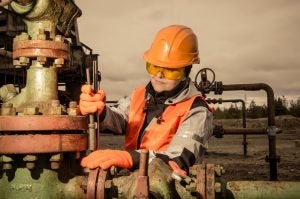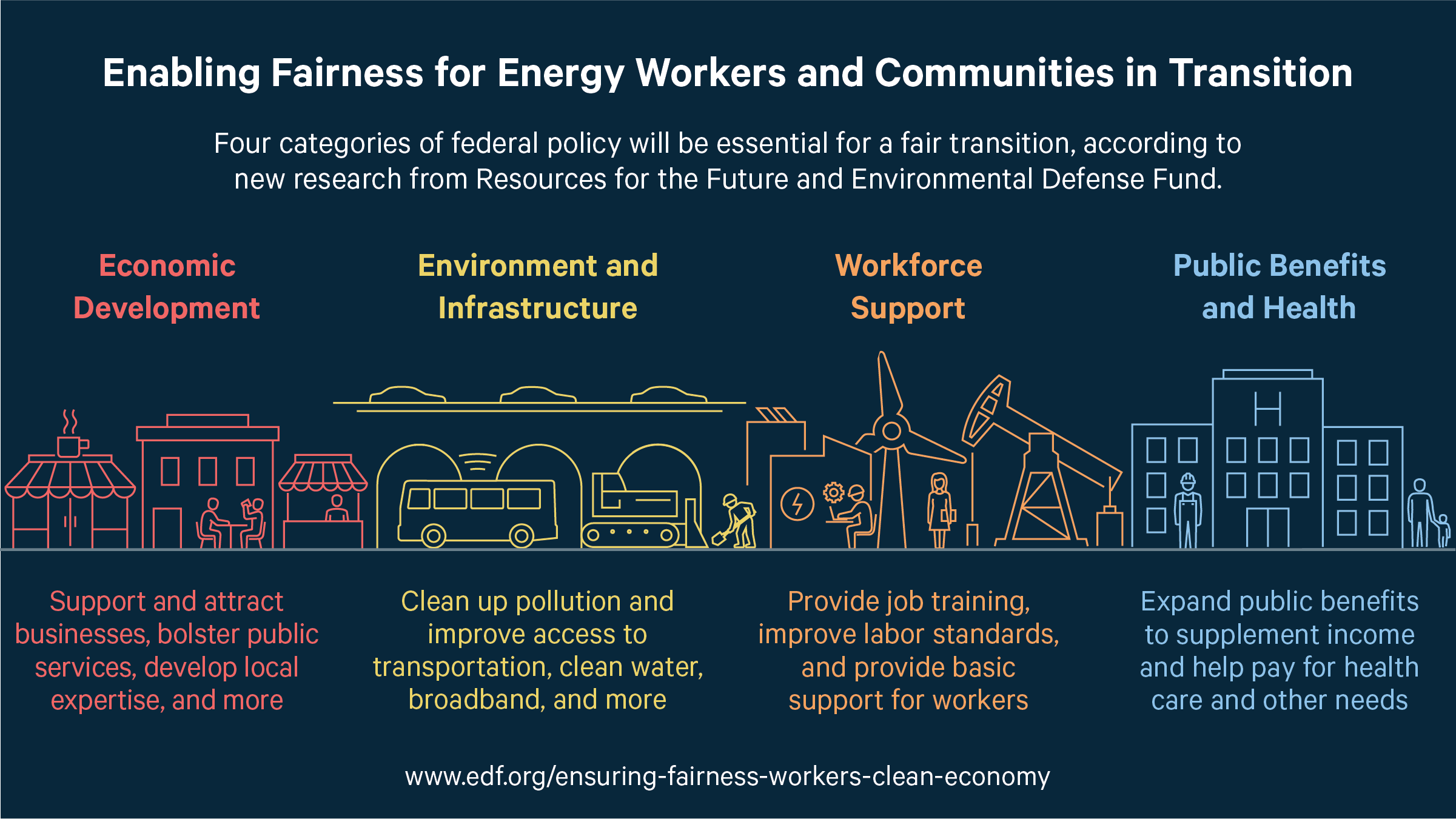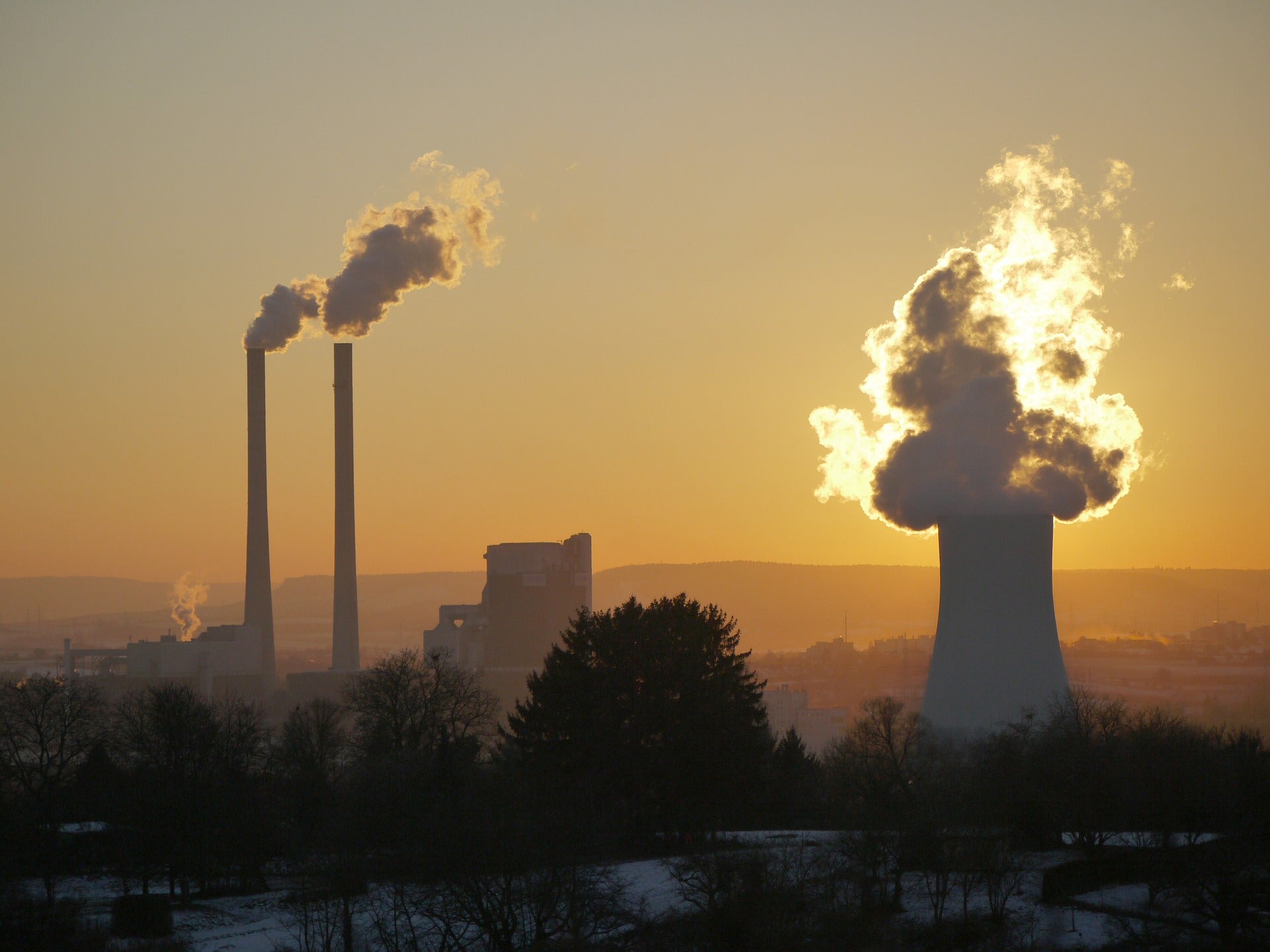
Creating opportunity for fossil fuel workers and communities: Lessons for a fair energy transition
In this culminating report, EDF and Resources for the Future condense lessons across four previous reports that can inform federal policy for supporting U.S. fossil fuel workers and communities in the shift to a clean economy. Wesley Look, Daniel Raimi, Molly Robertson, and Dan Propp of RFF and Jake Higdon of EDF contributed to the report described in this blog post.
The White House is making much-needed moves to take on the climate crisis and shift our economy toward a cleaner future. The majority of Americans are eager for this change and the clean energy and manufacturing jobs that go with it, but there are important questions about how to help fossil fuel workers and communities through this transition.
Many coal communities around the country have been on the frontlines of the energy transition, watching once bustling Main Streets grow quiet as people and businesses leave town along with the coal industry. As renewable energy and natural gas costs have fallen and outcompeted coal over the last decade, workers and communities dependent on coal have been left with few job prospects to support their families and significantly less revenue to keep towns running. The pandemic brought these issues to the fore not only for coal communities, but for oil and gas employment, which fell by more than 100,000 jobs last year.
To deliver on its campaign promise to support workers who have powered America for decades, the Biden-Harris administration must seize this moment to lift up and transform the local and regional economies across the U.S. that have long relied on fossil fuel production. The administration’s new interagency working group to facilitate investment in power plant and coal communities is a big step in the right direction, but much more policy support will be needed.
A new report from Environmental Defense Fund and Resources for the Future, which summarizes learnings and insights from over 100 federal policies and from four previous reports, demonstrates how lawmakers will need to deploy a suite of policies to ensure a fair and equitable transition for fossil fuel workers. Our research shows that four categories of solutions will be essential: workforce development and labor standards; economic development; infrastructure and environmental remediation; and public benefits. The report also contains key lessons for lawmakers on effectively implementing these policies.
Four core solutions will play a major role
To protect and invest in fossil fuel workers and communities facing the energy transition, federal lawmakers should harness four strategies:
- Workforce development and labor standards: At the heart of the energy transition challenge is helping impacted workers find and secure new, family-sustaining job opportunities; however, the overwhelming majority of U.S. power plant and mine closures happen with little proactive planning or training for workers. Workforce development programs can directly help workers through job training, career services and supplemental supports such as childcare. Labor standards can also play a dual role in a just transition — both by providing economic resilience and protections for workers today, and by ensuring the job opportunities of tomorrow are of high quality.
- Economic development: Communities reliant on fossil fuels as a key economic driver will likely need to tap into other comparative economic strengths as well as attract new industries. Policies such as grants to help diversify local economies, loans for small businesses, and technical assistance for local development efforts, can bolster local economies where jobs and revenue have been lost in the past and may be lost in the future.
- Infrastructure and environmental remediation: Beyond immediate job loss, plant and mine closures can leave behind a myriad of challenges, including groundwater and land contamination from pollution and crumbling infrastructure. Federal programs can support the build-out and update of critical infrastructure that enable businesses to thrive, including broadband and transportation networks. In regions with a legacy of pollution, environmental remediation programs can help build healthier, cleaner, and more resilient communities while creating jobs.
- Public benefits: The spillover effects from the decline in coal and other fossil fuels could leave energy workers, their families and broader communities in need of immediate assistance to soften the economic downturn. When even a strong combination of the above policies is not sufficient, public benefit programs—such as unemployment insurance, pension, and health care programs—can help create a holistic support system for workers and families and help stabilize local economies.
Key insights for harnessing these solutions
In addition to outlining the need for these interconnecting policy types, the report offers key insights for effectively implementing these policies. First, we know that strong coordination across local, state, tribal, and federal levels will be crucial for any program’s success. Communities should determine their own futures, and policies must empower them to help guide the investment of federal funding and resources. The Appalachian Regional Commission, which bolsters economic development across 13 states and combines federal, state, and local leadership, provides a successful model for connecting community stakeholders with federal grants.
Early and well-sequenced actions that anticipate economic change can play a major role in efficacy and cost. These might include convening stakeholders to proactively plan ahead of potential closures; ensuring workers receive pensions; providing advance notice of closures; implementing programs to shore up local tax revenues; and getting displaced workers into new, quality jobs before plants or mines shut down.
Critically, just transition policymaking should be equitable and inclusive. Lawmakers can address a legacy of underinvestment and environmental injustice in low-income communities and communities of color by prioritizing investments in infrastructure, environmental remediation and workforce development programs in these communities. And they should transparently engage affected workers and community members throughout both the design and implementation of programs.
Finally, federal efforts should bolster local government revenue to keep essential services running. For communities reliant on revenues from fossil fuel production for services, such as education and clean water, federal lawmakers may need to provide a lifeline of funding support. These funds could come from investments in additional local tax base opportunities, transfers from general funds, or new federal revenue sources, such as a carbon price. States can also help fossil fuel-dependent communities be more proactive in transition planning by giving them the tools and autonomy to manage their finances effectively.
Scaling up the clean energy transition to meet the urgency of the climate crisis will be a defining challenge of this decade — but how we get there matters enormously. Finding the right path will require us to truly listen to and lift up the needs and experiences of the workers, families and communities whose livelihoods are at stake in this transition. The insights and guidance offered in our joint research, as well as policy platforms built by the BlueGreen Alliance and the Just Transition Fund, can help lawmakers give these communities the tools and support they need to thrive in a clean energy future.
Read the full report: Enabling Fairness for Energy Workers and Communities in Transition.
Explore our joint series on ensuring fairness for workers and communities.













